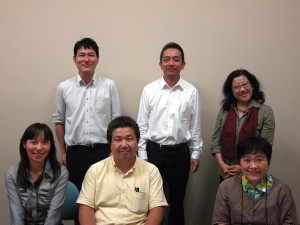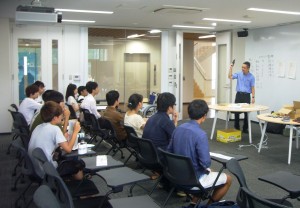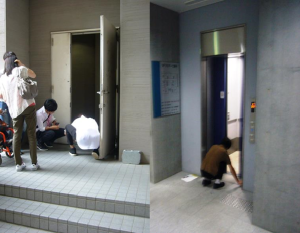1 Leaders of each unit and their research outlines (Research Briefs for each field and theme)
(1) Unit 1 “Tourism and Culture”
Unit Leader: Professor, Eriko Kawai, Graduate School of Comprehensive Survivability, Kyoto University
Title of research project: “Improving the brand image of inbound tourism through the use of cultural and cultural properties”
We will research methods to build a sustainable tourism brand by making better use of Kyoto’s culture and art, which are rare in the world, and improving the brand image of Kyoto tourism in the world. In addition to brand analysis of Kyoto, we will study feasible methods for Kyoto tourism and how to utilize the web so that Kyoto is said to be the only one, such as improving brand power as a tourist destination and researching successful cases in tourism that make use of culture and art through field surveys of tourist cities around the world.
(2) Unit 2 “Industry and Culture”
Unit Leader: Professor Naoko Tosa, Center for Research and Development in Higher Education, Kyoto University
Title of research project: “Revitalization of Kyoto Industry Based on the iCulture Concept”
Digitizing culture and art, extracting the core of it as modules (interchangeable components) (this concept is called “iCulture” by the research group). For example, we will research methods to revitalize Kyoto’s traditional and contemporary industries by making use of culture, such as creating products that incorporate modernity while preserving tradition by adding the essence of modern culture to traditional industrial products. In the course of the research, we will set up a study group with traditional and modern companies in Kyoto, discuss methodologies for improving the value of corporate products, and try to develop prototype products based on the research results.
(3) Unit 3 “Life and Culture”
Unit Leader: Associate Professor Takeshi Ise, Field Science Education and Research Center, Kyoto University
Title of research project: “Multifaceted research on the relationship between Kyoto’s climate, nature and culture”
We will study the interaction between people and the nature surrounding Kyoto that has created traditional lifestyles, rituals, and festivals in Kyoto through field surveys and literature surveys. Based on the research results, by systematically elucidating what is Kyoto-ness and by extension, what is Japan-ness, we will clarify the ideas that flow at the root of life in Kyoto, and propose a life in harmony with nature in the future. In addition, the contents of the recommendations will be disseminated to the younger generation, who will lead the next generation, through exhibitions and workshops such as media art.
(4) Unit 4 “Urban Development and Culture”
Unit Leader: Prof. Hiroshi Yoshioka, Center for the Future of Kokoro, Kyoto University
Title of research project: “New Development of Urban Development Based on the iCulture Concept”
When art is involved in community development, it is important not only to make use of exhibition spaces, but also to create human involvement and flow through art. To this end, in cooperation with art universities such as Kyoto City University of Arts, we will conduct practical research on the possibility of new relationships between art and culture and urban space, and research new methods that contribute to the revitalization of urban culture.
2 Future Schedule (tentative)
Late December 2016: Start of research
July 2017 Submission of Interim Report
March 2018 Submission of Research Report
Reference: Multifaceted Municipal Administration Research Projects Utilizing “University Knowledge”
1 Business Overview
Kyoto City is a “university city” where 38 universities and junior colleges are concentrated, and in order to reflect the “knowledge of the university,” which can be said to be an asset of the city, in the policies and measures of the city, the city will carry out a “multifaceted municipal government research project that makes use of the knowledge of the university” in collaboration with the University Consortium Kyoto. Specifically, with regard to the theme of “Revitalization of Kyoto through the Utilization of Culture,” which is designated by the city, multiple research units will be established by university researchers in each field (“Tourism and Culture,” “Industry and Culture,” “Life and Culture,” and “Urban Development and Culture”) according to the theme, and will be analyzed and examined from multiple perspectives. In the end, the results of each unit’s research will be compiled into a report as a research group and submitted to the city.
2 Eligibility
The principal investigator and the representative of each research unit must be full-time faculty members who belong to a university or junior college that is a member of the University Consortium Kyoto. This does not apply to collaborators of each unit.
3. Research Contract Fund and Research Period
Research commission fee: 5,000,000 yen (maximum)/year
Research period: Up to 29 (2 years)
Inquiries
University Consortium Kyoto Research & Public Relations Division
TEL 075-353-9130 FAX 075-353-9101
〒600-8216 Shimogyo-ku, Kyoto-shi, Nishitoin-dori, Shiokoji, Shimo-ku, Kyoto, Campus Plaza Kyoto
* Reception hours: Tuesday ~ Saturday 9:00 ~ 17:00 (excluding December 28 ~ January 4 during the year-end and New Year holidays)




















